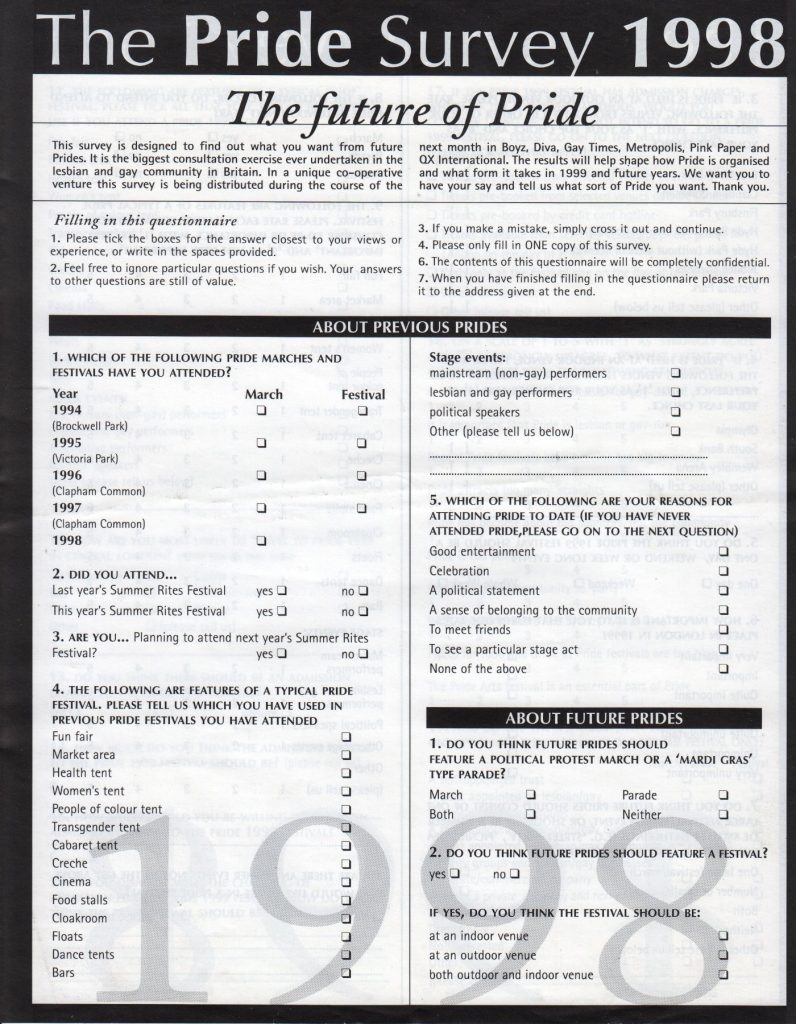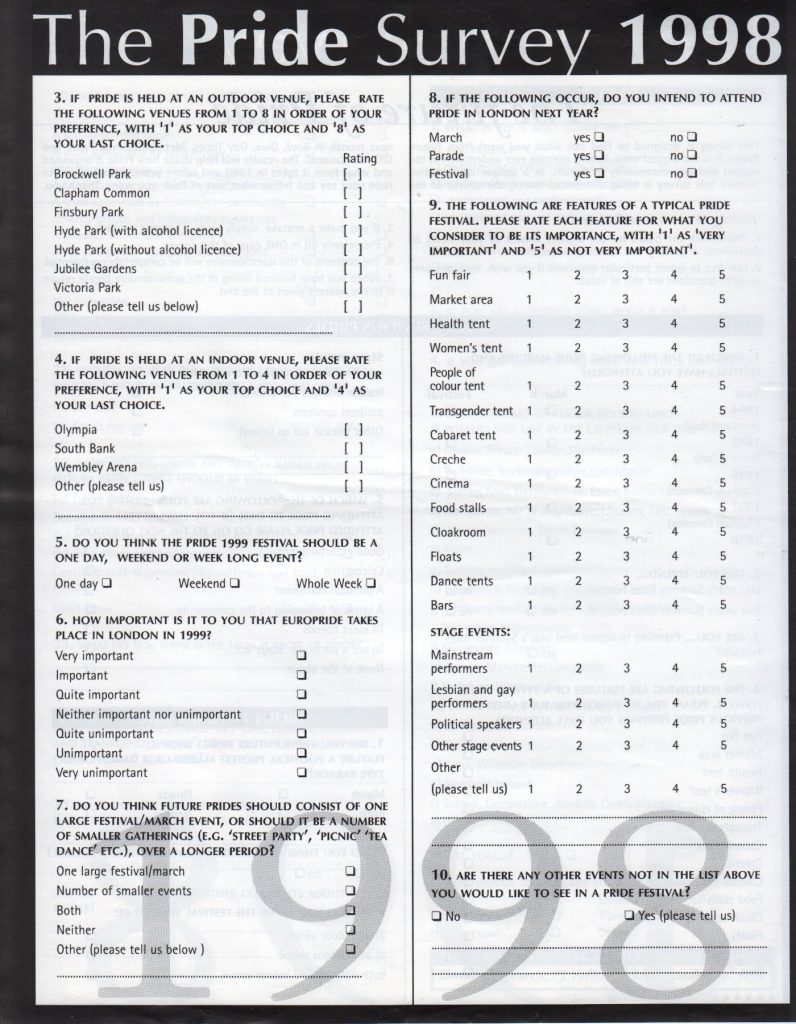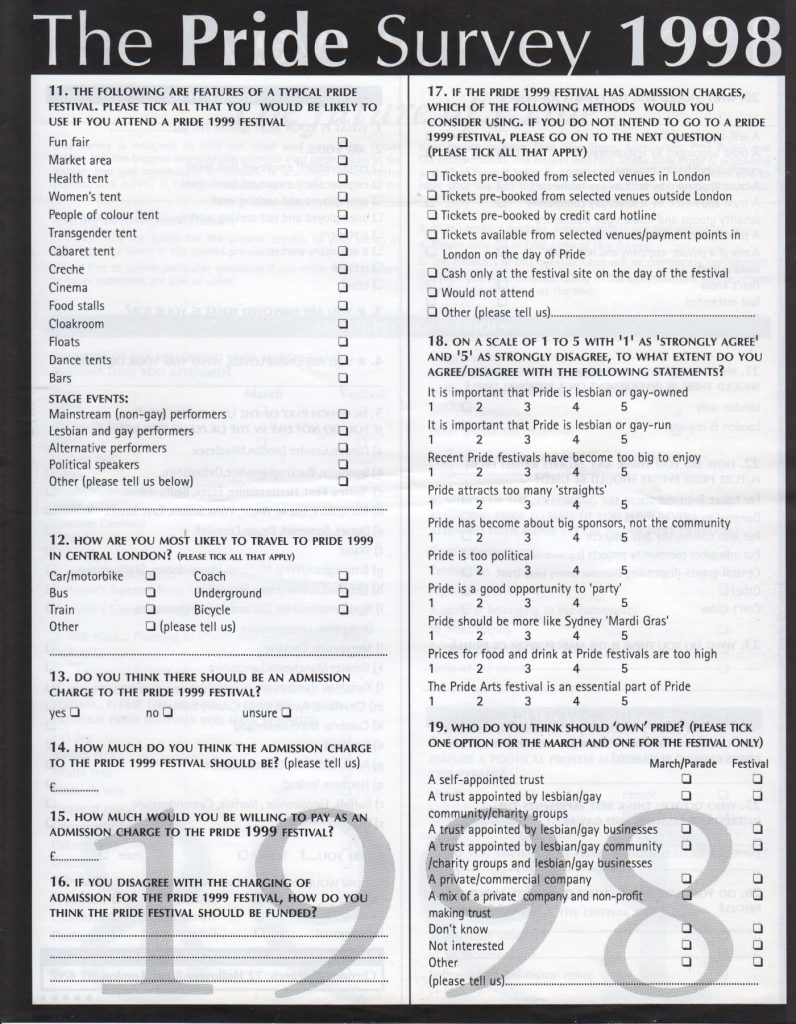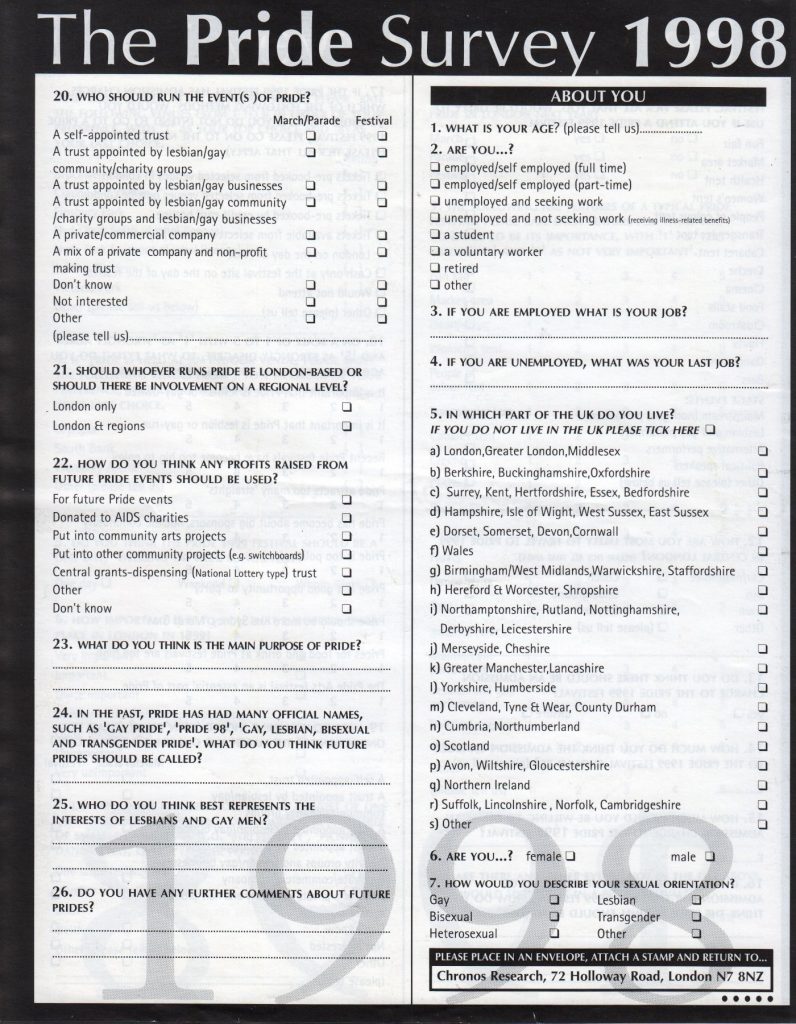Chronos was one of the many names of the company that published lesbian and gay newspapers and magazines such as Boyz and, between buying it from its original founders in the early 90s and later selling it to the 'publishers of Gay Times and owners of an adult shop' Millivres in 2005, the Pink Paper.
After the failure of Pride Events UK, the bunch of chancers that tried to run a commercial Pride event in London in July 1998, Chronos's Kelvin Sollis and possibly its co-owner, David Brindle, did the same maths that PEUK had done and discovered that running a commercial Pride event could be very profitable.
PEUK had ultimately failed not because they were biphobic shits[1]The disclaimer about me being too bitter and twisted to be impartial about this still very much applies… but because of cash flow: they didn't have the money to pay the necessary deposits when they needed to be paid. But Boyz in particular was distinctly profitable: each issue had loads of ads from the clubs and pubs that made up the London 'scene', plus ads for porn / cruising phone lines, plus ads from male escorts, plus ads for sex toys, plus… so there would be no need to wait for people to buy tickets.
Also unlike PEUK, the ownership of a large chunk of the lesbian and gay media meant that not only would a substantial amount of the advertising spend for the event effectively be paid to themselves, it would also be very easy to check first to see if enough people would in fact pay for an event that had always been free.
So, before the end of the year, a survey appeared in the Chronos titles, plus 'rival to Boyz' QX International, Gay Times, Diva, and 'another Boyz rival Thud under a new name' Metropolis. The survey calls this "unique" and, given the sometimes fractious relationships between the various publishers, it might well have been.
The opening paragraph also called it "the biggest consultation exercise ever undertaken in the lesbian and gay community in Britain", which was a sign of what was to come.
About previous Prides
After asking about attendance at Pride from 1994 – 1997, plus the 'last minute' march in July, it asked about attendance at Summer Rites. This was an out-and-out commercial lesbian and gay festival in London that ran from 1996 to 1999 (with a reprise in 2011). Presumably most of them made money, or organisers Kim Lucas[2]Owner of, amongst other things, Soho's lesbian Candy Bar. and Wayne Shires[3]Promoter of several gay clubs. wouldn't have repeated the first one, and it showed that there was money to be made.
Question four
"The following are features of a typical Pride festival. Please tell us which you have used in previous Pride festivals you have attended:
"Fun fair / Market area / Health tent / Women's tent / People of colour tent / Transgender tent / Cabaret tent / Creche / Cinema / Food stalls / Cloakroom / Floats / Dance tents / Bars"
Spot what was missed off that list 'by accident'.
I would have to check some other cities' Prides to be sure, but in London, it looks like only 1997 had had a transgender tent whereas it had a bisexual tent in 1996 and 1997. I'd love to know which ones had a cinema, but yet that made the list. 'Floats' are for marches rather than festivals, but yet that made the list.
That it wasn't an accident is shown by the next part of the question (as well as the chronic erasure in Chronos titles..)
"Stage events:
"mainstream (non-gay) performers / lesbian and gay performers / political speakers / Other (please tell us below"
About future Prides
Question one
"Do you think future Prides should feature a political protest march or a 'Mardi Gras' type parade?
"March / Parade / Both / Neither"
Possibly the most uncontroversial question was whether future Prides should feature a festival – given the relative attendance of the march and festival in previous years, the overwhelming response would have been 'yes', but it did then ask about the possibility of having it indoors. Mardi Gras did apparently seriously consider that later, but the costs were too large and Mardi Gras was, as far as the organisers were concerned, always about trying to make money.
Question nine
.. repeated the list of "typical Pride festival attractions" and asked respondents to them to rate them between 'very important' and 'not very important'. Again, if you wanted a bi space, you had to write it in as the answer to..
Question ten
"Are there any other events in the list above you would like to see in a Pride festival?"
Why yes, there fucking are, thank you for finally fucking asking…[4]See previous comment about the disclaimer!
Question eleven
.. repeated that list again, but around whether you'd be likely to use them "if you attend a Pride 1999 festival".
Questions thirteen to sixteen
"Do you think there should be an admission charge to the Pride 1999 festival?
"How much do you think the admission charge to the Pride 1999 festival should be? (please tell us)
"How much would you be willing to pay as an admission charge to the Pride 1999 festival?
"If you disagree with the charging of admission for the Pride 1999 festival, how do you think the Pride festival should be funded?"
I haven't yet found a copy of them publishing their version of what they said were the answers to these, but I would be surprised if there was much support for charging.
But basic maths says that say 50,000 people willing to pay a compulsory tenner makes more money than 250,000 people choosing to paying an average of about 60p each. This was going to be a commercial event, so fuck 200,000 of them, not least as that makes the event cheaper to run.[5]One of the biggest costs for Pride Trust was the hire of toilets, for example, and you obviously need many fewer of those with many fewer attendees.
The basic answer to the last question is what worked so well for the Pride Trust between 1993 and 1996, and nearly worked in 1997: running fund-raising events, selling concessions, and getting sponsorship. Sponsors pay more for events with more people attending, and you can also charge more for the concessions.
Had Kelvin done that, and been prepared to cover any small losses with the Boyz profits, he'd be a hero. Instead, Mardi Gras went on to lose much, much, much more than the Pride Trust ever did.
question eighteen
"On a scale of 1 to 5 .. to what extent do you agree/disagree with the following statements?
"It is important that Pride is lesbian or gay-owned / It is important that Pride is lesbian or gay-run / Recent Pride festivals have become too big to enjoy / Pride attracts too many 'straights' / Pride has become about big sponsors, not the community / Pride is too political / Pride is a good opportunity to 'party' / Pride should be more like Sydney 'Mardi Gras' / Prices for food and drink at Pride festivals are too high / The Pride Arts festival is an essential part of Pride'"
Utterly typical of Chronos that it asks if something that had been 'Lesbian, Gay, Bisexual and Transgender Pride' should be lesbian or gay-owned and -run.
It would be fascinating to know if Kelvin etc had been to and enjoyed the notoriously biphobic Sydney Mardi Gras before suggesting (and already have decided to adopt?) its approach.
On the plus side, they certainly did something about stopping festivals being too big, should anyone have found that a problem. Personally, I found the size of LGBT Pride 96 and 97 inspiring.
question nineteen
"Who do you think should 'own' Pride? (Please tick one option for the march and one for the festival only)
"A self-appointed trust / A trust appointed by lesbian/gay community/charity groups / A trust appointed by lesbian/gay businesses / A trust appointed by lesbian/gay community/charity groups and lesbian/gay businesses / A private/commercial company / A mix of a private company and non-profit making trust / Don't know / Not interested / Other (please tell us"
For a start, the Pride Trust was never 'self-appointed': following the previous company making a loss in running the first Europride in 1992 – if many more people come to your event than you expect, costs like clean up afterwards are higher – and subsequent liquidation, the replacement Pride Trust was from the very start a membership organisation. It also explicitly rejected the idea that it "owned" Pride.
What we got was, I suspect, what Kelvin always wanted: a private/commercial company owning a nicely apolitical "Mardi Gras" with the expectation that it would make lots of money even though I would be astonished if that was what many people wanted.
Question twenty
"Who do you think should run the event(s) of Pride?
"A self-appointed trust / A trust appointed by lesbian/gay community/charity groups / A trust appointed by lesbian/gay businesses / A trust appointed by lesbian/gay community/charity groups and lesbian/gay businesses / A private/commercial company / A mix of a private company and non-profit making trust / Don't know / Not interested / Other (please tell us"
Question twenty two
"How do you think any profits raised from future Pride events should be used?
"For future Pride events / Donated to AIDS charities / Put into community arts projects / Put into other community projects (e.g. switchboards) / Central grants-dispensing (National Lottery type) trust / Other / Don't know"
Missing from that list is "having the owners pocket them", but Mardi Gras managed not to make any on four out of the five years they ran it.
Question twenty three
"What do you think is the main purpose of Pride?"
Well, it's not to make money for some gay businessmen far too keen to be bi-erasing.
Question twenty four
"In the past, Pride has had many official names, such as 'Gay Pride', 'Pride 98', 'Gay, Lesbian, Bisexual and Transgender Pride'. What do you think future Prides should be called?"
I bet 'Mardi Gras' didn't get a majority here. It is interesting that 'Lesbian and Gay Pride' wasn't in the past names list, but that had been the name between 1983 and 1995.
Question twenty five
"Who do you think best represents the interests of lesbians and gay men?"
What an interesting question, on multiple levels. I can think of a list of people who didn't…
About you
Question six
"Are you..? female / male"
Compare, once again, the Pride Trust after the event became LGBT Pride.
Question seven
"How would you describe your sexual orientation?
"Gay / Lesbian / Bisexual / Transgender / Heterosexual / Other"
They knew the word "bisexual", they just didn't want to use it.
Notes
| ↑1 | The disclaimer about me being too bitter and twisted to be impartial about this still very much applies… |
|---|---|
| ↑2 | Owner of, amongst other things, Soho's lesbian Candy Bar. |
| ↑3 | Promoter of several gay clubs. |
| ↑4 | See previous comment about the disclaimer! |
| ↑5 | One of the biggest costs for Pride Trust was the hire of toilets, for example, and you obviously need many fewer of those with many fewer attendees. |



